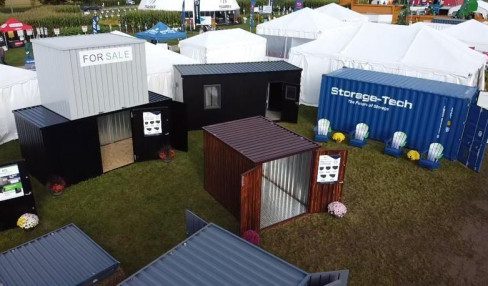Fields To Fortunes: Tips For Launching A House Flipping Business In Rural Towns
5 Mins Read
Published on: 21 February 2024
Last Updated on: 09 May 2024

toc impalement
Ever thought you’re the next big thing in the house-flipping? Well, you’re in luck. This compiled list of tips will turn your rural flipping dreams into a lucrative reality. It’s not all TV glamour, but you’ll have your own house-flipping business with a sound strategy.
So, roll up those sleeves, put on your hard hat, and delve into the exciting world of house-flipping.
So, How Does House Flipping Businesses Work?
House Flipping is a type of real estate investment strategy in which investors purchase properties with the simple intent of selling the same property for revenue instead of actually using it. Typically, investors who do house flipping focus on the purchase as well as the subsequent resale of a group of properties or even one property.

In fact, many investors try to start a general flow of income by simply engaging in regular flips.
So, how can you flip a property? The idea is to purchase the property at a low price and then sell it at a higher rate. But instead of adopting a simple purchase-and-hold strategy, it is vital to finish the transaction as soon as possible. This limits the total time, putting your capital at risk.
Generally, the priority should be up to speed as opposed to maximum revenue. That happens because every day ends up costing you relatively more money in insurance, property taxes, utilities, mortgage, and other expenses related to homeownership.
However, the house flipping business is often associated with multiple pitfalls. Any kind of profit that you have made is actually derived from cost appreciation as a result of the hot real estate space where prices rise rapidly. It is also possible that your profits are derived from capital improvements that were made to the property.
For instance, any investor can buy a fixer-upper in some hot neighborhood, make multiple renovations, and then offer the same at an expense that shows its new amenities and appearance.
Risks Associated With House Flipping:
You can make substantial fortunes from flipping in real estate. But flipping does appear to spawn relatively more in infomercials as compared to real life. Since hot markets can cool down when you least expect it, house flipping is a relatively risky affair.
Moreover, if the market conditions change before any property is sold, then the subsequent real estate investor is actually left owning a standard depreciating asset.

Flipping after you have improved an undervalued house depends relatively less on marketing timing. But the market conditions actually play a vital role.
Moreover, in the reno flip, investors make extra capital infusion into their investments, which increases the value of the property by more than the total cost of the renovations, closing costs, the purchase itself, and carrying costs.
Although house flipping sounds straightforward and simple in principle, it does need a lot more than a simple understanding of the real estate space to fare profitably.
Must-Haves For Your House Flipping Business:
If you are planning to expand your existing house-flipping business in rural areas or thinking about launching one in remote towns, then scroll down to find out the 11 must-haves!
- Executive Summary,
- SWOT Analysis,
- Market Analysis,
- Growth Strategy,
- Goals And Objectives,
- Exit Strategies,
- Competition,
- Lead Generation And Marketing,
- Financing And Projections,
- Opportunity, and
- Team Dynamic.
Tips for Launching a House Flipping Business in Rural Towns:

Now that you have a fair idea about how house flipping works and its associated risks, scroll down for some tips that will help you launch a house flipping business in rural towns.
1. Understanding Rural Real Estate Market:
Understanding the rural real estate market is crucial to your house-flipping success, so delve into its unique dynamics and trends.
It’s not quite like the real estate investor in its urban counterpart. The rural real estate market often moves slower, with property values influenced by factors such as agricultural prospects and the availability of amenities.
To thrive as a house-flipping business entity, you’ve got to master real estate investing in these areas.
For example, conducting a thorough market analysis in Texas yields positive results from local economic indicators, so with the assistance of an excellent real estate attorney, you decide to purchase a property from Texas Acres land for sale in Texas.
Remember, as a house flipper, patience is vital.
2. Sourcing Undervalued Properties:
As savvy real estate investors, you must spot discrepancies between market and property values. This part is where the gold lies.
Consider foreclosures, auctions, or distressed sales to find your first property. These often sell for less than their market value with commercial property insurance.
Use online platforms, local newspapers, and an excellent real estate agent, and network with locals. They’re often the first to know when a property is up for grabs.
3. Financing Your House-Flipping Venture:
So, how do house flippers finance their business? Hard-money lenders are quick and flexible options but come with higher interest rates. Business bank account loans could offer a middle ground with more moderate rates and terms.

Don’t discount a traditional bank loan, though. They tend to have the most favorable terms despite the longer approval process.
When financing your house-flipping venture, always determine your maximum purchase price first. It’s your budget for buying and renovating minus your desired profit. Stick to it religiously.
4. Renovation Strategies For Rural Homes:
Renovation costs can be a significant part of house flipping, so planning wisely is crucial. Rural homes often require upgrades to modernize them, but don’t overdo it. You don’t want to out-price your market.
Unexpected renovation costs can sabotage a successful house-flipping business, so always have a contingency plan.
5. Marketing Your Flipped Houses:
Strategic marketing is crucial for house-flipping businesses, particularly in less saturated real estate markets.

When you start a house-flipping business, don’t underestimate the power of word-of-mouth. Highlight the tranquility, space, and charm that rural homes offer. Leverage local networks and community events to create buzz about your house flip houses.
6. Managing Risks And Challenges:
It’s crucial to also focus on managing the potential risks and challenges of flipping houses in rural areas.
Managing risks involves preparing for unexpected expenses that might pop up during renovation. It’s a smart business plan to set aside a contingency budget for these unforeseen costs. It’s also important to keep an eye on market fluctuations.
Final Thoughts:
Ultimately, flipping houses in rural areas isn’t a walk in the park, but it can be your golden goose with the right strategies. So, turn those dusty diamonds into glittering jewels, creating a prosperous house-flipping property management business in your rural town.
ADDITIONAL READING:


















Comments Are Closed For This Article